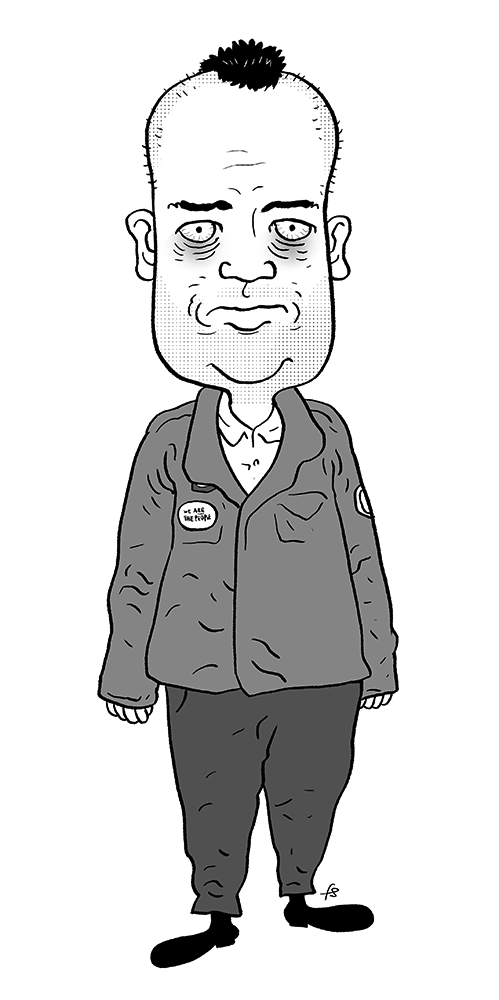The Short, Sad, Strange Life of Mr. Delicious
I’m not entirely sure why, but for some inexplicable reason, fast food joints periodically experience strange identity crises and decide that they need to market their wares to adults.
Burger-slingers get all fancy and deluded and become convinced that there is a fortune to be made from fast food for grown-ups. Sometimes these sad, strange, inevitably unsuccessful attempts to make shake shacks upscale take the form of menus full of salads or sit-down dining or premium hamburgers made from the meat of cows rather than horses.
Roast beef franchise Rax took the myopic insanity of trying to re-brand burgers and fries as classy food for discriminating adults to a whole new level with the introduction of their controversial cartoon spokesman Mr. Delicious.
Mr. Delicious’ message was twofold: my life is a waking nightmare and the food at Rax is tasty and affordable. Consumers, alas, were understandably so distracted by a cartoon fast food pitchman obsessing on the unrelenting nature of life’s unfathomable cruelty that the second half of his message—the one about how you should eat at Rax—failed to register.
In his introductory TV commercial, Mr. Delicious introduces himself as a cartoon fast food spokesman who seems to hate cartoons, fast food and himself, if not necessarily in that order. Anticipating the audience’s objections, Mr. Delicious concedes, “I know what you’r thinking: He’s a…cartoon. Cartoons are mostly for people who wet their pants.”
Even though Mr. Delicious is a cartoon himself, he’s not afraid to throw down the truth gauntlet and concede, up front, that cartoons are for babies, old people and the incontinent.
Not Mr. D. He explains that he’s a “special cartoon for adults.” Usually “special cartoon for adults” means animated porn. With Mr. D, however, it means something very different.
Each subsequent radio spot and television commercial gives us further insight into Mr. Delicious’ suicidal depression and debilitating anxiety.
In a second television commercial, Mr. Delicious segues awkwardly from promoting Rax’s value meal full of “adult-sized delectables for only 99 cents each” to complaining that he’s “a little over-extended” because “perhaps the Rax executives aren’t paying him enough to compromise his integrity.”
I find this fascinating. What integrity? Is Mr. Delicious in Fugazi? Is he a Marxist? What has he done in his life as a cartoon mascot that would lead people to think he’d sold out because he’s selling hamburgers on television?
Why would I want to visit a restaurant that under-pays Mr. Delicious so egregiously that he complains about it in commercials? From there we experience a hard pivot back to the land of the hard sell when he explains, “On the other hand, you can’t eat integrity. But you certainly can eat a hearty roast beef sandwich for ninety-nine cents.”
Mr. Delicious’ radio commercials were twice as long as his TV spots. That afforded the subversive geniuses behind the commercials an opportunity to give us a longer, more involved look inside the agonizing misery of Mr. Delicious’ existence.
The first radio spot begins the same way the TV commercials do before veering quickly and inevitably into psychodrama when Mr. Delicious admits, “Mr. Delicious doesn’t appreciate unnecessary commotion while he’s eating. It brings out the dangerous, hostile side in Mr. D. At least that’s what his analyst says.”
Mr. Delicious does not specify exactly why unnecessary commotion brings out the dangerous, hostile side in him so I am going to assume that Mr. Delicious saw and did some things in Vietnam that no one should ever see or do and ever since then good old Mr. Delicious just hasn’t been right in the head.
Mr. Delicious’ rage then turns outward as he talks witheringly of an unnamed fast food giant whose “bright yellow formica” upsets his stomach before he returns to the consumer-friendly theme of barely concealed rage when he enthuses, “Mr. Delicious always leaves Rax with a few bucks left. That’s just grand because his analyst charges a lot to keep Mr. D’s hostility all locked up.”
But the most unintentionally revealing and fascinating part of this unusually revealing and fascinating fast food commercial is when Mr. Delicious, in a deadpan voice absolutely hypnotic in its complete lack of energy and excitement, says of himself, “He can rest his feet on carpet, since Rax has confidence that Mr. D won’t drop his twisty fries. He can lose himself in a cheap romance novel without his elbows sticking to the table.”
Why is Mr. Delicious into cheap romance novels? What need do they fulfill in his sad life? Is he a frustrated romantic or a man in need of escape of any kind? Regardless, the mental image of Mr. Delicious sitting by himself, reading a bodice ripper as he picks absent-mindedly at his salad and baked potato is at once funny, sad and morbidly fascinating.
It only gets darker, sadder and weirder from there. In another radio spot, Mr. Delicious regales us with the details of his “bout with midlife crisis in 89.” He goes on to explain, with the perfect note of soul-deep self-loathing. “Fortunately (Mr. Delicious) was able to sell the Porsche back to the dealer. But much to his chagrin, he discovered that custom-designed hair weaves are non-refundable. Same for the rotating glitter disco ball he installed in his basement and that vacation to Bora Bora he took with those two young “friends” that left Mr. Delicious feeling empty and unfulfilled, unlike the robust sandwiches baked potatoes and refreshing drinks on the Rax menu for only 99 cents each.”
The sly, suggestive way Mr. Delicious says “friends" implies, if it does not explicitly state, that those younger friends were more like fuck-buddies he took to Bora Bora for the sexual adventure of a lifetime, one that found him lustily fulfilling all his most depraved and decadent fantasies.
I’m also going to assume that Mr. Delicious’ “friends” are a young man and a young woman and that Mr. Delicious is a swinger, something Mrs. Delicious doesn’t understand any more than she does his need to get wasted to avoid his tragicomic but often just plain tragic experience.
That’s the theme of the final radio spot I could find online where, after the usual preamble about Rax’s salad, pizza and pasta bar, Mr. Delicious confesses, “Mr. Delicious stayed out a little too late last night and he isn’t feeling very well. So it’s a good day for carbohydrates. Pizza and pasta will do the trick. Of course, having a wide selection of pizzas is helpful on a day when Mr. D is having trouble focussing. He’s bound to grab a slice of something tasty. If you’ve ever enjoyed two for one night at the Rusty Anchor, you know how dehydrated Mr. D must be. Some free Coke refills will hit the spot. Besides, enjoying a long, leisurely dinner at Rax’s will help him avoid the wrath of Mrs. Delicious, who isn’t very fond of the Rusty Anchor.”
Mrs. Delicious doesn’t seem too fond of Mr. Delicious. Then again, he doesn’t seem too keen on himself either.
Mr. Delicious was a fast food spokesman unlike any other. With his briefcase, bow-tie, plaid suit, “Dickety-dee” catchphrase and aura of ineffable sadness, Mr. Delicious wasn’t just different than every other fast food pitchman, he was the antithesis of everything a spokes-cartoon is supposed to be.
Where the Ronald McDonalds of the world are endlessly cheerful and upbeat, Mr. Delicious is depressed, a sad sack who talks about his unhappy marriage, mid-life crises and failed hair transplants as much, if not more, than he talks about Rax’s roast beef sandwiches, pizza buffets and free Coke refills.
Where other fast food pimps are carefree, Mr. Delicious is a man of constant sorrow, a melancholy figure seemingly on the verge of giving in to hopelessness completely.
If the average fast food mascot is a light-hearted figure of family fun, Mr. Delicious seemingly eats at Rax to avoid a family he despises and also because he is ultimately, hopelessly, fundamentally alone in the universe.
Imagine anti-comedy anti-hero Neil Hamburger selling hamburgers and you have a sense of the character’s warped genius. What would you expect from a restaurant with the slogan, “Rax: You can eat here?”
Rax: you can smoke here.
Mr. Delicious suggests a fast food analogue to OK Soda, the notorious, failed attempt to market a soda to Gen-X slackers by co-opting their cynicism, irony and intense hostility towards being sold consumer goods.
As a droll, absurdist parody of happy, hard-sell hucksters like Ronald McDonald and Burger King, Mr. Delicious is inspired. As actual advertising campaign, however, he was doomed from the start. It turns out there’s a reason fast food spokesmen are not suicidal, low-energy losers.
Needless to say, Mr. Delicious did not succeed. Rax declared bankruptcy not long after his introduction. The failing chain eventually brought back as their mascot a smiling anthropomorphic reptile named Uncle Alligator who kept his private life private and wisely stuck to promoting hamburgers and fries.
It’s unfortunate that Mr. Delicious did not not stick around longer because his unique persona and personality opened themselves up to the kinds of ad campaigns no other fast food restaurant would ever even consider, let alone implement.
If I were a copy-writer for Mr. Delicious I’d pitch the following decidedly adult, Mr. Delicious-friendly ideas for subsequent commercials:
*Mr. Delicious’ young “friend” had an unplanned “accident” because she and Mr. Delicious didn’t take the necessary precautions. Now Mr. Delicious needs the money he’s saving by eating at Rax to pay for a “procedure” to take care of Mr. Delicious’ young friend’s little “problem”
*Mr. Delicious wants to end it all, but first he’s going to binge on Rax’s pasta and pizza buffet
*Mr. Delicious bet on the football game and now some very not-nice men will break Mrs. Delicious’ kneecaps if he can’t come up with the two thousand dollars he owes.
*Mr. Delicious brought home some unwanted “souvenirs” from his trip to Bora Bora and needs to visit the clinic for some shots.
We’ll probably never see another fast food pitchman with Mr. Delicious. Commercially, that’s probably wise but creatively it’s unfortunate as his brief, curious existence single-handedly made the world of fast food advertising weirder and more interesting.
Did you enjoy this article? Then you will LOVE the Flaming Garbage Fire Edition of The Joy of Trash because it includes this piece and 51 more just like it!
Buy The Joy of Trash: Flaming Garbage Fire Extended Edition at https://www.nathanrabin.com/shop and get a free, signed "Weird Al” Yankovic-themed coloring book for free! Just 18.75, shipping and taxes included! Or, for just 25 dollars, you can get a hardcover “Joy of Positivity 2: The New Batch” edition signed (by Felipe and myself) and numbered (to 50) copy with a hand-written recommendation from me within its pages. It’s truly a one-of-a-kind collectible!
Or you can buy The Joy of Trash from Amazon at https://www.amazon.com/Joy-Trash-Nathan-Definitive-Everything/dp/B09NR9NTB4/ref=tmm_pap_swatch_0?_encoding=UTF8&qid=&sr= but why would you want to do that?
Check out my new Substack at https://nathanrabin.substack.com/
And we would love it if you would pledge to the site’s Patreon as well. https://www.patreon.com/nathanrabinshappyplace






